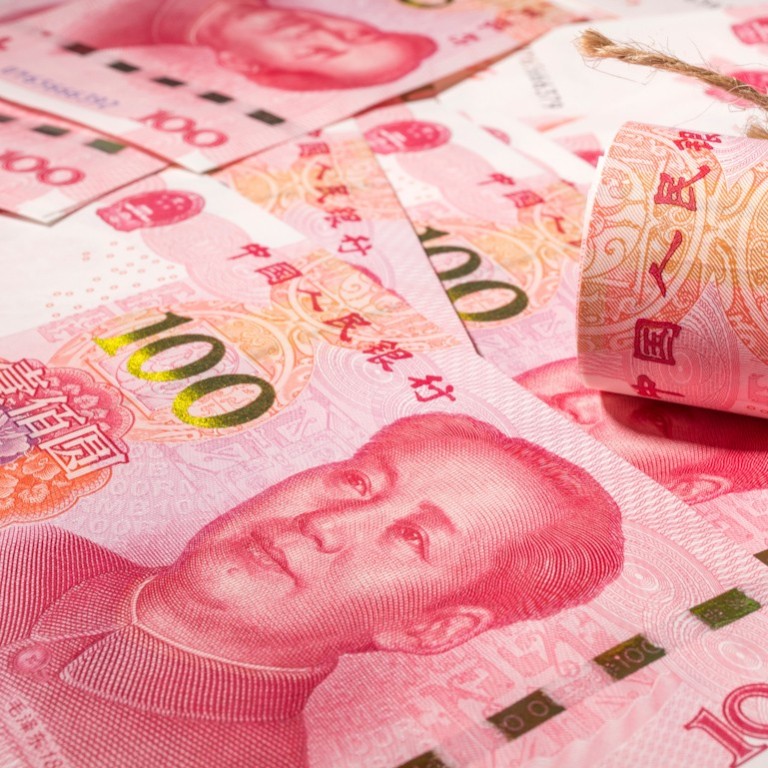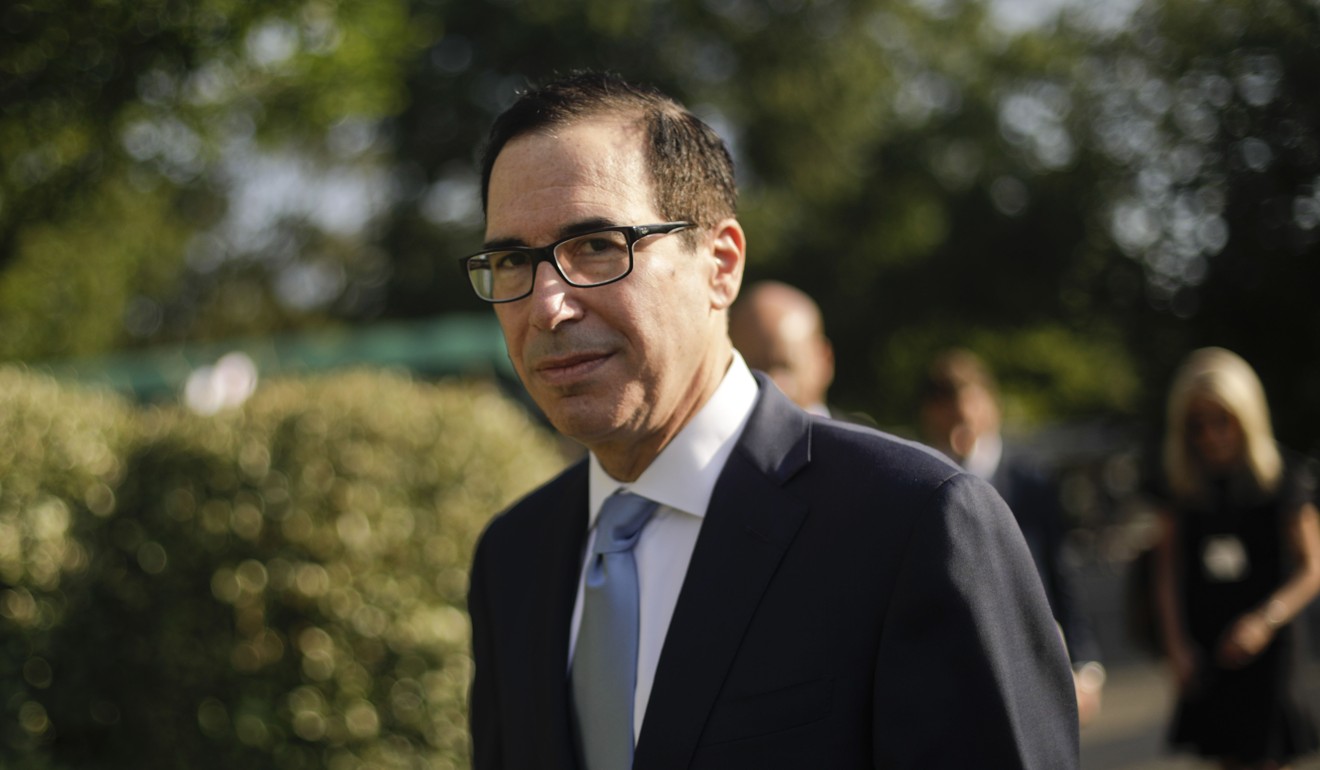
US declaration of China as currency manipulator roils global financial markets from the Americas to Asia
- Treasury Secretary Steven Mnuchin said his agency would engage with the IMF ‘to eliminate the unfair competitive advantage created by China’s latest actions’
- Financial markets fell from the Americas to Asia, with stock indexes plunging from Seoul to Wellington. Hong Kong’s Hang Seng Index gave back nearly all of its gains this year
Global financial markets from the Americas to Asia were roiled by the US Treasury Department’s first move in a quarter of a century to designate China a currency manipulator, after the Chinese central bank let the yuan sink to its lowest level in 11 years in apparent retaliation for US threats of new punitive tariffs on Chinese products.
Asia’s stock markets fell across the region for the second day, taking the cue from a 2.9 per cent plunge overnight in the Dow Jones Industrial Average, its biggest one-day decline since Christmas Eve last year.
Stock markets fell from Seoul to Wellington, while Asian currencies weakened. The yuan see-sawed in early-hour trading in the offshore markets, after China’s central bank set the onshore renminbi’s daily fixing at a weaker rate for the fourth day in a row.
China says ‘no such thing’ as currency manipulation despite US claim
Treasury Secretary Steven Mnuchin, “under the auspices of President Trump, has today determined that China is a Currency Manipulator”, the department said in a statement after the markets closed, adding that it will work with the International Monetary Fund (IMF) “to eliminate the unfair competitive advantage created by China’s latest actions”.
The Treasury Department justified its actions by citing China’s “concrete steps” in recent days to devalue its currency while maintaining substantial foreign exchange reserves.
“The context of these actions and the implausibility of China’s market stability rationale confirm that the purpose of China’s currency devaluation is to gain an unfair competitive advantage in international trade,” it added in the statement.
China suspends purchases of US farm products in retaliation for tariffs
China was the last country to be officially designated a currency manipulator by the administration of Bill Clinton in 1994.
During the 2016 presidential campaign, Trump vowed to officially label China a manipulator as soon as he became president, but passed up several opportunities to do so in required twice-yearly reports to Congress.
Under a 1998 law, the Treasury Department must name any countries that it finds to be using their legal tender to gain trading advantages over the United States.

While the administration decided not to tag China as such in its May report to Congress, it listed the country as one of nine – the others were Germany, Ireland, Italy, Japan, South Korea, Malaysia, Singapore and Vietnam – on a list that merited ongoing monitoring.
The fact that the administration chose Monday to issue the manipulator designation in the middle of a tit-for-tat trade showdown, rather than wait for the regular reporting period, suggests this is politically motivated, said Michael Hirson, head of the China and Northeast practice with Eurasia Group and a former US Treasury Financial Attache in Beijing.
Hirson said listing China as a currency manipulator wouldn’t necessarily have huge policy implications or lead to immediate sanctions.
“On its own, it does not amount to a whole lot,” Hirson said. However, “markets are going to register currency as an area of tension and potential danger”.
Stocks fell across Asia on concern the tit-for-tat measures between the US and China would open up a new currency battlefront, adding to the year-long trade and technology wars that are already roiling the global economy.
Japan’s Nikkei 225 fell by as much as 2.9 per cent, and Seoul’s Kospi plunged 2.8 per cent, while the Hang Seng Index weakened by 2.9 per cent.
In mainland China, the CSI300 Index fell 2,7 per cent, while the benchmark gauge on the Shanghai bourse plummeted 3.1 per cent and the key index in Shenzhen retraced by 3.9 per cent.
US stocks plummet as China announces two-pronged trade war retaliation
“This announcement overnight is expected to hit risk appetite further,” said JPMorgan Asset Management’s Asia-Pacific chief market strategist Tai Hui. “Export-oriented markets in Asia, including Taiwan, South Korea and Hong Kong, are likely to be at the forefront of this.”
An added concern once Trump designates China a manipulator is that hardliners may heap political pressure on his administration to take action, potentially leading to a growing number of countervailing duty cases that further impede trade.
The People’s Bank of China (PBOC) has denied that it devalued the yuan in response to US tariffs. In a statement, PBOC Governor Yi Gang said China will “not engage in competitive devaluation, and not use the exchange rate for competitive purposes and not use the exchange rate as a tool to deal with external disturbances such as trade disputes.”
The latest salvo over currency is in part another bit of posturing in the high-stakes economic and political showdown between two giants unwilling to back down, some said.
“It’s a stunt,” said Derek Scissors, resident scholar with the American Enterprise Institute and chief economist with the China Beige Book. “China is not manipulating its currency more than it has for years so why do this now. It does manipulate it, but it did that a year ago and two years ago.”
Given that the yuan is controlled and China does not have a market financial system, its currency is by definition manipulated, and done so to align with the government’s interests, he said.
“The objective of the stunt is so Trump can have a dramatic reaction,” Scissors added. “It’s the president firing back at China saying ‘I can do this’.”
China exchange rate drop could continue in 2020 to offset US tariff impact
The wording of the Treasury Department announcement – including a call for the IMF to evaluate the merits – may suggest that the agency is taking a measured approach.
“Given all the things that the US could do, this is pretty gentle,” Hirson said. “It smacks a bit of Mnuchin trying to show he is responding to Trump’s tweet.
“Mnuchin may be trying to pre-empt more aggressive action by Trump and the China hawks,” he added.


